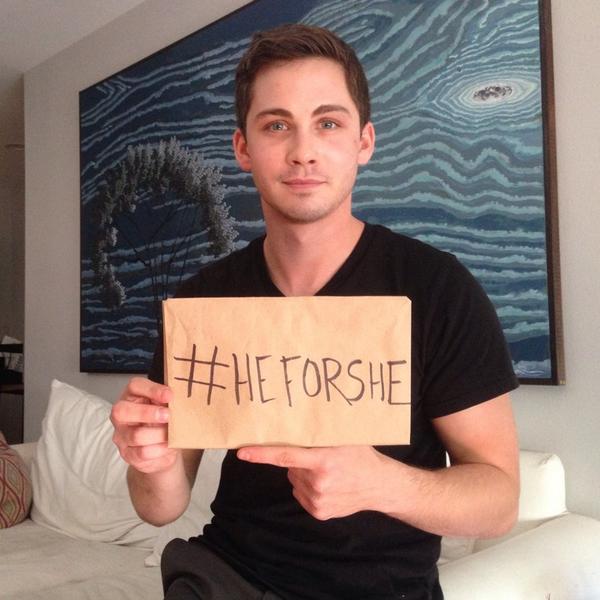How Men Can Aid Feminism (Hint: It's Not Taking The #HeForShe Pledge)
Everyone’s been freaking out about Emma Watson’s U.N. feminism speech, and understandably so. Unlike many women in Hollywood (and everywhere, frankly) who have said they don’t identify with feminism or don’t need feminism, Watson loudly proclaimed her feminism. She also got men (so far, more than 130,000 of them) to willingly join the conversation while simultaneously shutting down the “man-hater” misconception.

SEE ALSO: Best And Worst Reactions to Emma Watson's UN Speech
The HeForShe pledge commits one to “take action against all forms of violence and discrimination faced by women and girls.” What does that actually mean? How exactly does a man go about taking this action? Neither Watson nor the HeForShe campaign answers these questions, unless you count hashtagging #HeForShe on all your social media platforms as fighting for gender equality.
Another problem with HeForShe is its name. The movement claims to “bring together one half of humanity in support of the other half of humanity,” but in naming it HeForShe, the movement shuts out the portion of humanity that doesn’t identify within the gender binary.
The biggest reason HeForShe is a step in the wrong direction is that it attempts to restructure feminism to frame it around men and their struggles.
SEE ALSO: I <3 Feminists Who Critique Other Feminists
In Watson's speech she urges men to join the feminist movement to "free" their daughters, sisters and mothers. The thing is, before women are any of those titles, they are living, breathing, feeling human beings. But that's not enough, apparently. Encouraging men to get involved on behalf of specific women in their lives may be an effective way of drawing them in emotionally, but it also says that a woman's existence is only validated by her connection to a man through those relationships.
Women have never been told to care about men because they have brothers, fathers or sons. Women care because it seems obvious to care about the well-being of other people, regardless of gender. So why do we have to give men so many reasons to try and convince them to care?
While it's true that the way society traditionally defines masculinity can limit men and how they express themselves, gender inequality hurts women in many more pressing ways. Centering feminism around men not only ignores the countless ways men benefit from patriarchy, but it also takes the spotlight off core issues like gender-based violence, pay inequity (especially with women of color), and the way women’s behavior is constantly controlled by social expectations.
With all that being said, men can absolutely play an important and positive role in gender equality. Here’s how:
1. Listen, listen, listen.
So you’re interested in being an ally? The best way to help is to foster a feminist space by listening to women and what they have to say. If you’re speaking out about women more than you’re listening to them, you’re doing it wrong.
2. Hold the mansplaining.
Do you think you understand an issue better than a female-identified individual who is living through it? Spoiler alert: you don’t. As Neon Tommy Contributor and self-identified male feminist Evan Pensis put it: “You can’t come from a place of someone else’s experience.”
SEE ALSO: How To Be A Male-Identified Feminist And Mean It
3. Consider your audience.
If you’re surrounded by women who are discussing an issue, it’s not exactly the right time to unload all your thoughts and ideas. If there are no women around to take part in the conversation, however, it can be appropriate to advocate for them. This is not an invitation to speak on behalf of women, but if you’ve done #1, then you may be able to share useful insight.
4. Be willing to learn.
When you are trying to help and a feminist calls you out, it’s easy to get offended or angry. Try instead to understand where the person is coming from rather than taking it as an attack.
5. Use your privilege wisely.
Your privilege (whether it be male, cis-gender, able-bodied, etc.) can be a useful tool in aiding feminism because you can use it to magnify voices that aren’t given the same consideration as yours.
Emma Watson was and is a very smart choice to be the face of the U.N. campaign. It may be questionable having an extremely privileged white woman calling for global equality, but if there’s anyone who can make men and women jump on the feminism board, it’s a beautiful and adored actress.
That being said, Watson can use her popularity in much better ways. The first is to continue learning about feminism, specifically within more marginalized communities like women of color and LGBTQ persons. Once she gains a better understanding of the complicated channels of gender oppression, Watson can then use her influence to bring these often ignored narratives into the spotlight.
Reach Staff Reporter Sophia Li here. Follow her on Twitter here.



